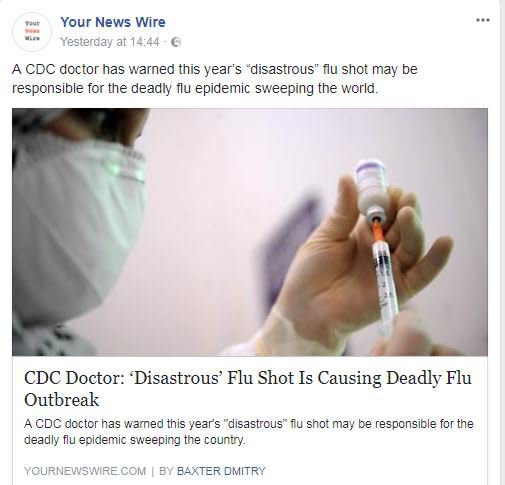Anti-vaccine site spreads Facebook hoax claiming flu shots ‘caused this year’s deadly outbreak’

A dangerous hoax story claiming that the flu vaccine actually caused this year’s deadly outbreak of flu is proving highly popular on Facebook.
Spreading this sort of falsehood could kill, by persuading elderly people (who might die from the flu) not to have a jab which could save their lives.
The fake story, from YourNewsWire, has become one of the most-engaged stories on Facebook of the last two weeks, Newswhip reports.

The completely false story quotes a non-existent doctor who says, ‘We have seen people dying across the country of the flu, and one thing nearly all of them have in common is they got the flu shot.
‘Some of the patients I’ve administered the flu shot to this year have died. I don’t care who you are, this scares the crap out of me.’
The piece says, ‘Many medical experts now agree it is more important to protect yourself and your family from the flu vaccine than the flu itself.’
The story is a pack of dangerous lies, spread to scare and misinform, IFLScience warns.
The NHS says, ‘Serious side effects of the injected flu vaccine are very rare. You may have a mild fever and aching muscles for a couple of days after having the jab, and your arm may
be a bit sore where you were injected.
‘Flu vaccine is the best protection we have against an unpredictable virus that can cause unpleasant illness in children and severe illness and death among at-risk groups, including older people, pregnant women and those with an underlying medical health condition.
‘Studies have shown that the flu jab will help prevent you getting the flu. It won’t stop all flu viruses and the level of protection may vary, so it’s not a 100% guarantee that you’ll be flu-free, but if you do get flu after vaccination it’s likely to be milder and shorter-lived than it would otherwise have been.’

 Yahoo News
Yahoo News 

